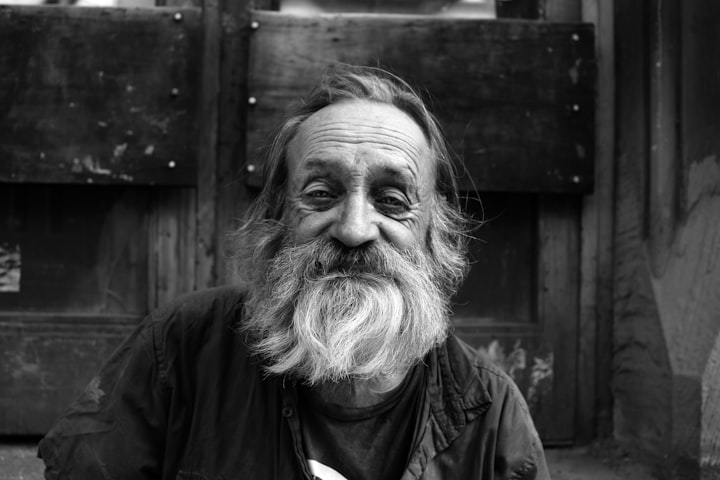Saving Banana Man
A Success in Skid Row But at What Price?
I had never dreamed of becoming a social worker. My mum, and a host of aunts, uncles and cousins were all happiest in front of the classroom. Being a teacher was in my blood. I had always escaped the tension and sorrow at home by retreating to my bedroom and diving deep into school projects.
My parents divorced in 1964. Quite a scandalous act at the time but my mother had her reasons. The best teaching position she could find was in a small isolated town on the coast of British Columba. She moved my brothers and me during my 13th summer. Walking out on the front porch of our new home that first morning left an indelible imprint. Raucous crows swirling against a leaden sky, the odor of the pulp and paper mill, the resonant boom of the ferry approaching the wharf and not a soul in sight. I was not impressed. My deepest desire was to return to the big city.
My high school years blended together. I was always an honor student or "brain" as my two close friends and I were labelled by our peers. I had a string of broken hearted boyfriends because I ran from emotional entanglements.
Finally 1970 rolled in and I would graduate, seize the baton from my family and become an English teacher! Life had other plans.
On a blustery February afternoon, I met with Mrs. Perkins, the Guidance Counsellor. All the Senior Honors Students were having career appointments with her. Piece of cake for me since I knew I was going to teach. As I settled into the chair across from her, she dropped a bomb.
"Geri, I know that you had planned on becoming a teacher but currently there is a glut of young teachers looking for work in the province and more coming up right behind them. I know that math and science are not your strongest subjects but..."
"And the sight of blood makes me queasy and bedpans would make me barf and sick people depress me", I stated woodenly.
"So nursing is not an option," sighed Mrs. Perkins.
(Dear Reader: Have I mentioned that I lived in an Isolated Town in 1970? The only career aspirations deemed appropriate for young female academics were teaching, nursing or...)
"What about Social work? How do you feel about that?"
"I don't know. I'll look into it," I answered, as I leapt from my chair without making eye contact and left. Always be strong and do not express emotions. It was a survival skill I had learned growing up with an alcoholic father and it served me well.
Research into the career of Social Work at the archaic public library yielded little. Being helpful, considerate and open-minded was part of my DNA as a Canadian, eh? I was strong and able to cope with whatever Life threw at me. Maybe I could make a positive difference as a social worker for hundreds of unfortunate people. It may be a good fit after all. At least I would be leaving this boring town that was too small to have any higher education.
University back in the big city was a revelation! Access to lectures on a range of cutting edge topics and a state of the art library held me enthralled. My first year on campus flew by. During my second year of prerequisite courses I was appalled upon learning that my Behavioral Psychology professor had spent Christmas break torturing rats. I persevered and completed the course work needed for entering the School of Social Work.
Something inside held me back from moving forward into the next year of studies. Was it a still, small whisper of doubt? Taking two years off and working in the field in different capacities could shed some light. I was unaware at the time of what an imminently wise decision I had made.
For a year, I worked as a Social Worker's Assistant at the Vancouver General Hospital. My boss was Mrs. Wright (who was always right).
My duties included:
Phoning pregnant teens to offer clinic appointments and planning; chaperoning homeless teens while they shopped with vouchers for clothes at thrift stores; organizing Meals On wheels for elderly shut-ins; listening to young adults admitted to the hospital after injuries from DUI accidents; driving elderly patients to clinic appointments and whatever scuttlebutt work Mrs. Wright would give me.
We met weekly on Friday afternoon to discuss the "cases". Mrs. Wright never referred to the individuals by name, rarely smiled, and watched the clock as the minute hand slowly approached 5:00 pm. Did she even care? Restless and bored, I quit. I wanted more challenging work where I would make a difference. The Do-Gooder fire in me was burning bright.
Three weeks later, I was scanning the Want Ads in the newspaper and I read:
"NEEDED: EMERGENCY FIRST AID RESPONDERS FOR DOWNTOWN EASTSIDE CLINIC. DUTIES INCLUDE OUTPATIENT CARE IN PATIENT'S OWN HOME. TRAINING PROVIDED"
I didn't know where Downtown Eastside Clinic was located in Vancouver but having worked in a hospital, I knew that I had experience. (I was now hardened to the sight of blood.) I sent in an application. A week later, I was invited to the Clinic for an orientation.
That day, the city bus transfer took me deep into the oldest part of East Vancouver near the waterfront. Block by block, the buildings grew dirtier and bleaker, the bars on shop windows and doors ever present and always men with bowed heads and grubby clothes disappearing into narrow alley ways. Our base at the Downtown Eastside Clinic was bordered by a city park and decrepit hotels. Upon my arrival, I saw a motley crew of all ages who had answered the ad and were filling out name tags. I joined the group of young people with hopeful expressions. During the week of Orientation, we were trained in basic care of ulcerated leg wounds caused by falls, scrapes and fights. We soon realized that the majority of our outpatients were alcoholics and drug addicts which impaired their ability to keep clinic appointments. Their "own homes" were the cheap, dismal hotel rooms in the vicinity.
We were split into pairs of male and female and were admonished never to cover "our beat" alone. My partner Marc and I were both young and idealistic. Dressed in our armor of jeans and T-shirts with our official Clinic Employee lanyards, we were two knights off to save denizens in distress!
That first morning, the teams were given our assignments by Ellen, the Clinic Director. She provided us with a map to the community with hotel names included. All the pairs would rotate on a weekly basis to cover the first daily duty - waking up the homeless people sleeping in the park next door. Ellen selected Mark and I as the first team for this assignment.
Indignant, Mark sputtered, "That borders on harassment!"
Ellen turned to him and calmly stated the latest news. A homeless man who had appeared to be sleeping in the park for two solid days had been discovered on the third day to be dead. And dead for quite some time. Mark and I received a lot of verbal abuse every morning that week for waking up the park residents. It was music to our ears.
Summer heat released odors of gasoline and garbage from the broken pavements. In Skid Row, the reek of unwashed bodies, urine and vomited beer intensifies the stench. When Mark and I walked by open alleys, we would hold our noses and hurry by. But it was nothing compared to entering the seedy hotels. As we climbed the stairs from one dim floor to the next, the walls were sour with stink. And I thought bedpans were revolting.
Three weeks in and we had established a limited rapport with our clients. We would remind them that we were there for wound care and initiate a simple banter. One of our regulars was Gus. He was happy to exchange jokes with us and always made us laugh. On our fourth visit, my knock on the door elicited a muttered "Come in."
I opened the door to Gus' red, enraged face and he lunged at me with a knife. I slammed the door. Hearts racing, Marc and I stumbled downstairs to the lobby. One of our clients was there, reading the newspaper. We stammered about our encounter with Gus.
"Gus has been drinking Pink Ladies. You two have to be careful."
"Pink Ladies" was street vernacular for Sterno, a lighter fluid. It was a stark reminder that most of our outpatients were in the grip of alcoholism or drug addiction and we could never be certain of their condition when we did our rounds.
Frequently, Ellen would hand us the address of a new client that a social worker had screened recently. Mark and I would often be the first strangers knocking on their door to offer help. Some were beyond our band-aids of assistance.
One broken individual lived in a small cubicle piled high with garbage. According to the wizened landlord, the tenant stumbled out onto the streets every other day and collected bags of garbage. He would haul them back to his room and sort through the contents. When the tenant had not responded to our repeated knocking on his door, the feeble landlord unlocked it and hobbled off quickly. When the door opened, the shaggy, grimy occupant roared at us before plunging back into the piles of refuse. One corner of the cubicle was his designated toilet. We shut the door and returned to the clinic with our report. Ellen made phone calls to various agencies. Gradually it was revealed that the landlord had been forging the tenant's name on disability checks and pocketing much more than the rent. The case was turned over to the Mental Health authorities. The landlord was investigated. Go, Team! We had genuinely helped!
Banana Man was a classic success story. The neighborhood kids had given him the nickname because he had no teeth and only ate bananas from the nearby market. Recently a social worker had discovered that he was a prisoner in his bedsitting room. After a number of strokes, he was unable to safely venture outside. The landlord forged his signature, cashed his checks and provided a bunch of bananas every other day.
Mark and I were let into his room by the unscrupulous landlord. (If looks could kill, we would be stepping over his dead body on the way out of the hotel.) Upon our greeting, Banana Man slowly turned from his seat by the window and smiled. He had long graying hair, a full white beard and kind, heavily lidded green eyes. Worn suit pants and a denim work shirt clothed his compact frame. He could be someone's grandfather! My heart was touched.
I checked the condition of the room while Mark sat beside him and told him that we were there to help. Banana Man listened patiently until Mark suggested moving him to a Senior Center. At that, the old man frowned and grumbled "No."
Mark took a different tactless approach.
"When was the last time you had a bath?"
The old man reddened and dropped his gaze. Mark promised that the next time we came, he would assist Banana Man with bathing.
"And while you two are busy, I will take all the clothes, sheets and blankets to the coin laundry. That will be a nice change, eh?"
Banana Man looked up at me and grinned.
Mark and I were so pleased to be able to help this dear old man. After his bath and dressed in clean clothes, he sighed happily and shook both our hands. We got a social worker involved who finally convinced Banana Man to move to Senior Assisted Living. Mark made a point of visiting him one weekend after he had settled in. He was thrilled to report that our favorite client was thriving.
We could have used a lot more happy endings.
Six weeks later, we had not found Joe in his room when we came on our regularly scheduled Wednesday visit to do a dressing change. Joe was a lot of fun. He would tell us of his adventures as a cook in the logging camps. His room always smelled of bleach and he bragged about how he was limiting himself to one beer a day. We were looking forward to seeing him so checked in on the following day since we were in the neighborhood.
The door to his room was ajar. We knocked and I called out "Joe?" as Mark entered the room.
Joe was wearing an undershirt, sitting on his bed, and crying. A yellow stream of urine was falling to the floor and his feet were surrounded by empty wine cartons. He looked up, caught sight of me and bawled "What are you doing here? Its not Wednesday!"
I went off on him with righteous indignation. I shamed him. I screamed. He cried louder. Mark pulled me out of the room and demanded "Geri! What got into you?"
I took a deep breath and murmured "Everything."
The last outpatient I remember was Mike, a young strong guy who had lost his job at the logging camp due to an injury. He was recovering well and looking for a job but needed new eyeglasses. I lined up an eye appointment for him and gave him a ride. When the eyeglasses were ready, I delivered them to his place. I found a Security job for him at a factory and Mark took him to the job interview. Mike was hired and was all set to begin on the 5th of the next month.
Ellen received a call from his new boss that day. The new hire had not shown up. Mark and I went to check on Mike. He had received his monthly check, got royally drunk, fell down the stairs, broke his glasses and was still drinking on the first day of his new job. Much time and effort had gone into the arrangements and to what end?
One pivotal afternoon, I came home from work and my roommate asked "So how was your day?"
I burst into tears. I had been moving through my life with frozen feelings to be able to handle any situation that was thrown at me. My heart was very unhappy about what I encountered every day. I needed to love myself more and not be a martyr for the cause. In a whoosh of clarity, I realized that I had to honor my authentic self above all else.
The next day, I walked into Ellen's office at the Clinic and shut the door quietly behind me. She looked up from her paperwork, smiled kindly, and inquired, "Yes, Geri?"
I told her what I had learned.
I cannot help anyone who does not want to help themselves. I cannot continue to freeze my feelings to protect myself. Above all else, I must follow my heart. I will never be a social worker. Thank you for the job opportunity that has given me this clarity. This is my final day.
Ellen listened with a sympathetic frown on her face. When I was finished, she came around the corner of her desk and folded me into a hug.
And I cried and cried as my heart soared.






Comments
There are no comments for this story
Be the first to respond and start the conversation.